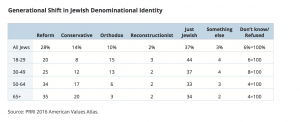Hanukkah, the eight-day Jewish “Festival of Lights,” began the evening of Tuesday, December 12. To commemorate the triumph of the Maccabees and the rededication of the Second Temple, Jews and those celebrating the holiday light the hanukkiah, a nine-pronged candelabra, play dreidel, and eat fried foods like latkes (potato pancakes) and jelly doughnuts. Although the holiday often gets prime billing because of its proximity to Christmas and other winter holidays, most Jewish Americans do not report that Hanukkah is particularly important. However, views about the holiday vary substantially among Jewish Americans by denomination and age.
PRRI’s Jewish Values Survey found that only 10 percent of Jewish Americans say that Hanukkah is the most important holiday to them personally. Jewish Americans who do not claim a formal denominational identity are more likely to say it’s important. Those who identify as “just Jewish” are the most likely (20 percent) to say Hanukkah is the most important Jewish holiday. In stark contrast, significantly fewer Jews who affiliate with a particular denomination, including Reform (seven percent), Reconstructionist (two percent), Conservative (seven percent), and Orthodox Jews (one percent), say that Hanukkah is the most important Jewish holiday to them personally.
Perceptions of the importance of Hanukkah also vary significantly by age. Jewish Americans under the age of 40 are about seven times as likely as Jewish seniors (age 65+) to say that Hanukkah is the most important holiday to them personally (20 percent vs. three percent, respectively).
That both non-religious Jewish Americans and young Jewish Americans are more likely to prioritize Hanukkah is due largely to the differing patterns of denominational identity. While more than one-third (37 percent) of all Jewish Americans say they are “just Jewish” when asked about their denominational affiliation, among young Jewish Americans (age 18-29), that number jumps to more than four in ten (44 percent). About one-third (34 percent) of Jewish seniors say they are “just Jewish.”






